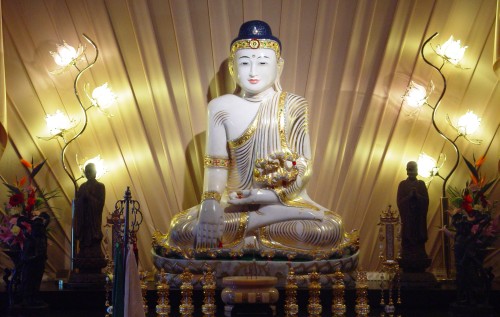Liang Huang Jeweled Repentance Ceremony
The Liang Huang Jeweled Repentance liturgy was written and compiled in the Southern Liang Dynasty (502-557) in China by the famous Chan Master Zhi Gong at the request of Emperor Wu.
One night, a few months after the death of his Queen Chishi, Emperor Wu heard some rattling noise outside his bedroom as he was getting ready for bed. When he peeked outside his bedroom door, he saw a big boa constrictor staring at him. Surprised and frightened, the Emperor said to the snake, “This is a stately court, a place of majesty and decorum, hardly a place for a snake to hang out.” The snake said, “Your Majesty, I was your queen Chishi. I am now reborn as a snake because in my past life, out of anger, jealousy, self-indulgence, and cruelty, I destroyed many things and harmed many lives. Now I have nothing to eat and no cave to hide. Most painfully, I am constantly being bitten by the many insects living under my scales. It is out of desperation that I come to seek help from your Highness, hoping through the merits of your Majesty, I can escape this vile body.” Then the snake disappeared.
The next day Emperor Wu consulted with Chan Master Zhi Gong. The Master said, “The karma obstacles of the former Queen must be cleansed by repentance and prostrations to the Buddha.” The Emperor then asked the Master to compile a list of Buddhas’ names, and to write the text of repentance based on the sutras. The Master compiled a repentance liturgy that was ten volumes long. The Emperor then followed the liturgy and made repentance on behalf of his queen. One day, as he was getting ready to chant, he smelled a sweet fragrance in the room. When he looked up, he saw a person of grace and beauty standing before him. The person said, “By the grace of your Majesty’s sincere repentance on my behalf, I am now reborn as a heavenly being in the Trayastrimsa Heaven. I come especially to thank your Highness.” Then the person disappeared.
The fascinating story behind the origin of the Liang Huang Jeweled Repentance demonstrates the power of reflecting on our wrongdoings, accepting responsibility for them and repenting with whole-hearted earnestness. The courage to repent and reform immediately brings peace and blessings to us.


